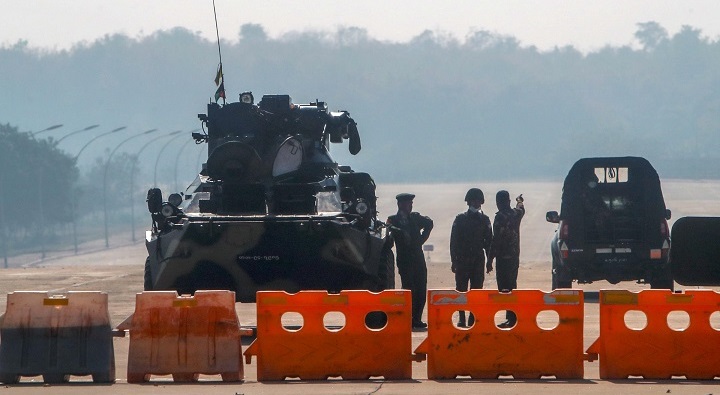
Democracy in Myanmar grew uneasily over a couple of decades through a delicate balance of external and internal powers, the military, the tribal militias, the Thai influence groups, the United States and, of course, neighboring China. All these forces cooperated to find a political balance that would support the democratic forces led by Aung San Suu Kyi and partially sideline the top brass.
The coup last Monday in Yangon came about as US-China ties are unravelling and thus the old balance in Myanmar no longer holds. The US is against the coup but also China was unhappy about it, as shown in the cautious, unsupportive reaction of the Global Times[1]. Beijing has vast, pervasive relations all over Myanmar.
China supervises a strategic pipeline from the Indian Ocean coast to Yunnan, and sits on many billions of assets in the country. Moreover, because China is so invested in Myanmar a political downturn there will reflect badly on Beijing with far reaching effects.
It has a great interest in the stability of the country and virtually none in rocking the boat. Yet, in Beijing quite likely they didn’t see the coup coming and didn’t see that fraught ties with the US would have vast, unintended consequences. It could be the beginning of an unintentional domino effect for China on the global scene. It is possible that China missed it and it is missing it because of a larger issue of mindset.
For centuries, possibly since its unification under the first emperor, Qinshi Huangdi, China thought that, as far as external threats were considered, its main concern was to keep its internal condition strong and stable. If China itself had no rebellions, no domestic rifts, and no toxic power struggles, then no country was strong enough to challenge and defeat it.
China set a clear pattern of priorities in its strategic thinking: internal issues were paramount compared to external issues, to the point that external issues were virtually negligible once the home front was secured. This mindset was applied to withstanding the main external threats that came invariably from Central Asia and the north. There, relatively small groups of fast-moving and battle-hardened nomads or semi-nomadic populations could plunge into China and pillage and pull the whole country apart because the local farmers and peasants were used to a life of toil and were no challenge to the northerners, even if they were divided and not well coordinated.
However, if these farmers were molded into stable cohorts and hardened with great discipline, efficient tactics, good weapons, and plenty of food, they would create an unbreachable great wall against foreign invasions.
The mainstay then was that China was too big, too populous, and too rich for any foreign countries to pose a real threat, provided China stayed united. This security pattern was based on a worldview defined by China’s geographic position. That is, China was virtually isolated from the rest of the planet. Not isolated like the cultures in the Americas, which were totally out of touch, but far enough removed so that actual threats were minimal or manageable given its size. In fact, dynasties collapsed when internal pressure lent an opportunity to bandits (like the Han, the Ming, or the Communists) or foreigners (like the Tang or the Machu)—or so was the story told in official histories.
Central Asia and Tibet created a great barrier in the west. The Central Asian steppes and deserts in the north were also insurmountable barriers. Then there were jungles and the mountains in the south and the oceans in the east.
However, this geographic situation has gradually changed since Europeans discovered the American continent and reached Asia from the east, and thus put the Indies and China in contact with a Euro-centric economic and political world, starting from the ocean and not from the Asian land gateway.
Twice[2] China didn’t understand where and what was the great challenge and threat. The first time was between the late 16th century and early 17th centuries when the Spanish reached China from Macao. The other time was exactly 200 years later when the English reached China, also from the south, near Macao, in Hong Kong. In both cases, China didn’t understand the rules of global trade, and by failing to adjust to and master those rules, it created indirect economic crises that spilled into social and political crises that eventually led to the demise of the Ming dynasty and then the Qing dynasty. Is this time different for China?
Before going into this, we should look at the genesis of the present imperial power, the USA. “From the beginning of its existence, the United States was engaged in diplomacy, power politics, wars, and every foreign entanglement imaginable. That was inevitable. Nations rarely last long if they aren’t aware of foreign threats and opportunities,” argues George Friedman.[3] In fact, the 13 American colonies were clever in leveraging the existing rivalry between England and France, offering France an opportunity to regain on the American continent what it had lost to England a couple of decades earlier. That is, all great powers in the West emerged by skillfully maneuvering foreign politics with a mix of diplomacy and war, adapting them to internal management.
Yet, the change of political geography around China in the past century de facto forces China out of its old thinking and into a new mindset. Or so it should be, because despite the evidence that China is no longer as isolated and protected as in its old history, many in Beijing still think according to imperial patterns.
In fact, Xi Jinping is possibly the first Chinese “emperor” to wake up to the different reality, and he is reacting to it and trying to integrate into the world.
At Davos, he said[4]: “Zero-sum game or winner-takes-all is not the guiding philosophy of the Chinese people. As a staunch follower of an independent foreign policy of peace, China is working hard to bridge differences through dialogue and resolve disputes through negotiation and to pursue friendly and cooperative relations with other countries on the basis of mutual respect, equality, and mutual benefit.”
This happens on the back of the BRI (Belt and Road Initiative), the Chinese initiative thought to have its own worldview. The problem is that it is antagonistic to the present world order. From the start, it didn’t happen in cooperation with the US but seemed almost as if it was intended to replace the US, and thus it was perceived as not in cooperation with the existing global order.
Legacy of World War II and Cold War I
This happens also because China and its BRI are in a different position in the region. Asia is somehow strange compared to Europe, for instance, which was also a theater of World War II and the Cold War. Around China, two unsettled legacies still have ramifications in the area and the world. One is the legacy of World War II: the division between China and Taiwan. Once upon a time, the two sides of the Strait held rival claims to governing the whole of China, and now they are still part of an unfinished civil war dating back to 1949. The second legacy is that of the Cold War: China is still ruled by a communist party that was defeated in other parts of the world.
It’s true that the Cold War is still unfinished business, and the West has still qualms and issues with Russia, but there is no longer an ideological rivalry here. In China, officially the Communist Party doesn’t wish to spread its ideology all over the world. However, its resentment of Western-style democracy is open and blatant.
Moreover, its support, although possibly half-hearted, for the North Korean regime reminds the region and the world that the Cold War is not yet over in this neck of woods. With the baggage of these two long unfinished pieces of business, China is facing a challenge unprecedented in its history: to criticize and change the world or to be part of the world. Beijing should think about this mountain of challenges it is facing. It is war and politics.
If Clausewitz was right in his classic definition of war as a continuation of politics by other means, then politics is also a continuation of war by other means. In war, you win with good and strong weapons—and so it happens in politics. The PLA (China People’s Liberation Army) wants to acquire all the best weapons in the American arsenal, but the CCP (Chinese Communist Party) refuses to procure one of the best weapons in American politics, democracy.
The culture of the CCP is made by a mix of aspiration to modernity, i.e. Westernization and Americanization; revival of old culture, i.e. “Confucianism”; and banditry, described in the classic novel Water Margin or in the noble loyalty of the early Mohists and the philosophical writings of Lüshi Chunqiu.
These are good weapons for a new “guerrilla politics” but modern politics is made of different tools. Here a brief and cursory list: Dependable policing, yes, but modulated by means of persuasion, built with lofty ideals and with mediation that helps to build consensus. This has to be buttressed by economics, where consensus is also “bought,” while respecting some dignity. Here a certain amount of dissent is healthy as it keeps the game up and forces improvements.
Here China not only refuses to adopt the political tool of democracy but appears to fail to see its own reality.
Jeffrey Wasserstrom wrote,[5] “Living in China is confusing now.” This is because, as the novelist Yan Lianke said, “it can feel like being in North Korea and the United States at the same time.” I recall smiling and nodding when he made the remark, during a roundtable discussion[6] at Duke University’s campus outside Shanghai three years ago. In one brief sentence, he captured just how special and strange China can seem—“a country that has both gulags and Gap stores.”
These contradictions make it difficult for China to deal with the world, but also for the US, the present global leader, to deal with China. Both don’t understand each other and thus fail to address the other properly.
Recently an authoritative anonymous American[7] offered a comprehensive strategy for dealing with China and, in sum, found in Xi’s leadership the root of the present evils. The writer thus recommended a return to the pre-2013 order, the one before Xi came to power.
Yet the logic of the essay is strange, from a purely realistic and pragmatic point of view. If the analysis is correct and Xi is the problem, then let’s look at the present situation.
There was a power struggle (or there still is a power struggle), and Xi won over his enemies. Why talk to and encourage his enemies, who have been beaten? Better talk to the winner, not the loser, i.e. Xi himself, no? His enemies are down, weak, and have lost for eight years. Do we really think that if the US or any other foreign power supported them, they would manage to topple Xi? Can the US successfully stage a coup in China, a country where it has no penetration and little or no internal influence, which is extremely complex, and where Xi conversely has huge clout?
Moreover, is the analysis really correct? It argues that things went sour with the US since 2013, when Xi came to power after then Chongqing Party Chief Bo Xilai’s “attempted coup.” Yet perhaps things started going wrong with the US after the 2008 financial crisis,[8] and especially, if we want to pinpoint a moment, after the row in Copenhagen between Chinese Premier Wen Jiabao and US President Barack Obama, as China and the US failed to find an agreement on climate. If so, Xi inherited the problem and didn’t create it. Xi may have made the problem worse, but if the problem started in 2008, then it goes well beyond removing Xi.
Most importantly, all this discussion about internal Chinese stability is played according to the Chinese traditional mindset: make China internally unstable, break its unity, and then China can be conquered. Without breaking its unity, China is invincible. Yet is this logic really right? Especially since the general conditions don’t apply any longer.
The main issue is that the world around China is much bigger than China, and the main failure in Chinese logic is that it’s impossible for China to dominate it following its old imperial pattern. If China could reasonably do it, it might have already won. But it has not because most of the global economy is growing colder to China, and issues are not simply about the economy, but about the power of charming through free debate, and winning the hearts and minds of people even with little or no economic reward. It is about Chinese politics taking an arrow out of Western quiver: democracy.
[1] https://www.globaltimes.cn/page/202102/1214556.shtml
[2] See also http://www.settimananews.it/informazione-internazionale/false-beliefs-of-the-inevitable-chinese-rise/ and http://www.settimananews.it/informazione-internazionale/200-years-crisis-and-its-knowledge/ and http://www.settimananews.it/italia-europa-mondo/the-visions-of-chinas/
[3] See The Storm Before the Calm, 2020
[4] http://www.xinhuanet.com/english/2021-01/25/c_139696610.htm
[5] https://www.theatlantic.com/international/archive/2021/01/xi-jinping-china-biography/617852/
[6] https://dukekunshan.edu.cn/en/event/humanities-research-center-launch-event
[7] See https://www.politico.com/news/magazine/2021/01/28/china-foreign-policy-long-telegram-anonymous-463120
[8] See http://www.settimananews.it/informazione-internazionale/false-beliefs-of-the-inevitable-chinese-rise/






China’s strategy is allow US focus on China, therefore neglecting its own domestic responsibilities. Then wait them out. Classic Art of War strategy. China hoped this would last 100 years (5 generations), but thanks to increasing focus on China, USA will collapse within 20 years. In a cyber-AI-blockchain-quantum world of the future, all codes will be Chinese (all road will lead to Rome). Huawei & TikTok are just the beginning for the “flood”. The old “real world” will only count 10%. So China basically owns the future world.
No need for classic “wars”. A Chinese AI world, traditional weapons will be useless before being used. Great history lesson, but you lack the vision of futuristic world where human thought no longer matters.
the world mean only west? LOL